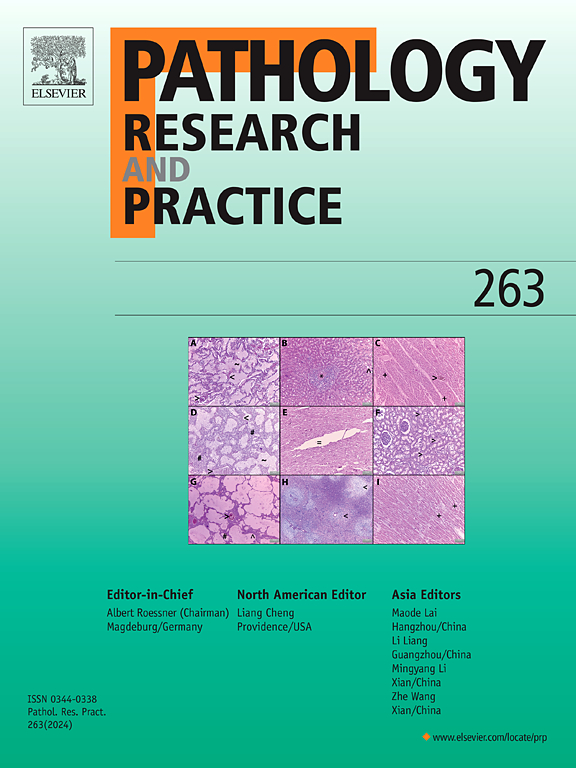胃食管癌的免疫组织化学生物标志物评分:计算机能帮助我们吗?
IF 2.9
4区 医学
Q2 PATHOLOGY
引用次数: 0
摘要
越来越复杂的癌症诊断和治疗选择给病理学家带来了越来越大的负担,特别是在免疫组织化学(IHC)生物标志物的评估方面。在胃食管癌(GEC)中,包括腺癌和鳞状细胞癌亚型,必须评估多种预后和预测性生物标志物以指导治疗。这些评估需要细致的评分,耗时,并受到观察者之间和内部差异的影响。鉴于全球范围内病理学家的短缺,基于人工智能(AI)的工具已经成为提高生物标志物评分效率和准确性的潜在解决方案。这篇综述的目的是回答标题中所包含的问题:人工智能能否帮助我们在GEC中进行IHC生物标志物评分,如果可以,如何帮助我们?检索PubMed和b谷歌Scholar以确定相关研究。分析显示,人工智能在提高PD-L1和HER2等生物标志物的可重复性和减少病理学家工作量方面表现出了希望,尽管与其他癌症类型相比,人工智能在GEC中的应用仍然有限。与此同时,预测计算方法正在出现,可能彻底改变生物标志物评分。通过减轻复杂评分系统和昂贵的附加分析的负担,人工智能有可能显著增强GEC生物标志物评估的病理实践。本文章由计算机程序翻译,如有差异,请以英文原文为准。
Immunohistochemical biomarker scoring in gastroesophageal cancers: Can computers help us?
The increasing complexity of cancer diagnostics and treatment selection has placed a growing burden on pathologists, particularly in the evaluation of immunohistochemical (IHC) biomarkers. In gastroesophageal cancers (GEC), both adenocarcinoma and squamous cell carcinoma subtypes, multiple prognostic and predictive biomarkers must be assessed to guide therapy. These evaluations require meticulous scoring, are time-consuming, and suffer from inter- and intra-observer variability. Given the worldwide shortage of pathologists, artificial intelligence (AI)-based tools have emerged as a potential solution to enhance efficiency and accuracy in biomarker scoring. This review aims to answer the question captured in its title: can AI help us in IHC biomarker scoring in GEC, and if so, how? A search of PubMed and Google Scholar was conducted to identify relevant studies. The analysis reveals that AI has demonstrated promise in improving reproducibility and reducing pathologist workload for biomarkers such as PD-L1 and HER2, although its applications in GEC remain limited compared to other cancer types. In parallel, predictive computational approaches are emerging that could revolutionize biomarker scoring altogether. By alleviating the burdens of complex scoring systems and costly additional assays, AI could have the potential to significantly enhance pathology practice in GEC biomarker evaluation.
求助全文
通过发布文献求助,成功后即可免费获取论文全文。
去求助
来源期刊
CiteScore
5.00
自引率
3.60%
发文量
405
审稿时长
24 days
期刊介绍:
Pathology, Research and Practice provides accessible coverage of the most recent developments across the entire field of pathology: Reviews focus on recent progress in pathology, while Comments look at interesting current problems and at hypotheses for future developments in pathology. Original Papers present novel findings on all aspects of general, anatomic and molecular pathology. Rapid Communications inform readers on preliminary findings that may be relevant for further studies and need to be communicated quickly. Teaching Cases look at new aspects or special diagnostic problems of diseases and at case reports relevant for the pathologist''s practice.

 求助内容:
求助内容: 应助结果提醒方式:
应助结果提醒方式:


